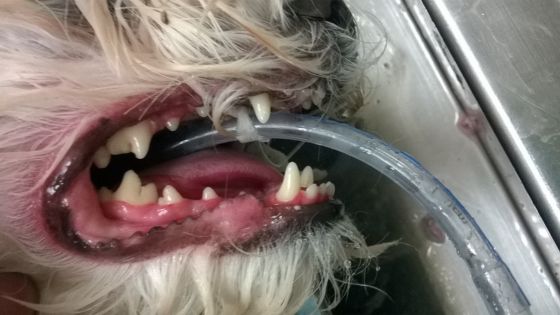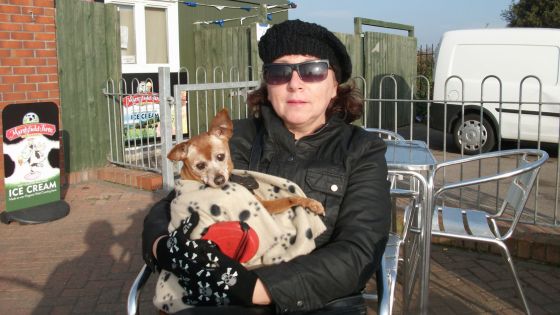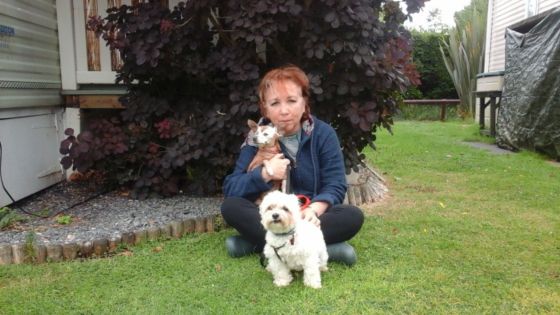As senior dog parents, we’re always looking for tips on how to keep our senior pups healthy, happy and comfortable. What better source to look for that advice than those who share their lives with one!
From being patient and grateful for every day, to giving them daily walks and regular vet visits, these are just a few of the many helpful tips you’ll find in this article. Keep reading for 26 ways to give your senior dog the best life possible!
1) Be Patient
This tip is first for a reason. We all have or will lose our temper with our dogs at some point, and we’ll also feel very guilty for doing it. Caring for an old dog with health challenges is frustrating and sometimes overwhelming, especially if we’re doing this alone. Maybe we watch them constantly circling (a common symptom of dementia), perhaps it takes forever for your dog to get to the end of the street, or he or she is peeing everywhere no matter how many times they go out. This would test even the most patient of people.
We all know none of this is their fault, it’s part of the aging process, but in the heat of the moment “knowing” isn’t always enough.
Treat your dog with love and compassion, and while you’re taking that leisurely stroll, practice mindfulness. Take note of your surroundings, smell the flowers as it were and enjoy being together. Put your headphones on and listen to your favorite music or audio book. When things feel a bit too much, don’t underestimate how helpful a walk around the block can be. I know because I’ve done it many times!
2) Accommodate Their Needs
Here are some examples of what I mean about accommodating your senior dog’s changing needs.
♦ Stiffer joints could mean losing footing on slippery floors and difficulty getting up from their bed. Yoga mats, interlocking rubber mats, booties and support harnesses will make a big difference. If they’re having difficulty climbing stairs, getting onto the couch or into the car, ramps and steps are the answer.
♦ Elevating food and water bowls can make it easier and more comfortable for your dog to reach, but be careful not to raise them too much. Forcing your dog to reach can cause bloat.
♦ The bed they loved for years may no longer suit their needs, which means it’s time to try something new. Look for one that offers extra padding, is lower in the front for ease of access, and is thick enough to offer support. Raised sides will give them something to lean against. It may be a case of trial and error to find the one he’s happy with.
♦ One of my dogs, Red, loved sleeping on a human comforter. It was big enough to offer lots of padding, but light enough for her to arrange it into any shape she wanted. I also kept a fleece blanket on it in the winter in case she needed extra warmth.
♦ A night light in the hallway and/or bedroom will help guide your dog should he wander.
♦ In my opinion, the dog stroller is the greatest invention. Even if your dog can still walk, bring it with you. He can walk as long as he’s comfortable, then put him in the stroller when he needs a break. Believe me, even a 9lb dog can get very heavy after carrying her for just 10 minutes! We’re on our second stroller, and I honestly don’t know how we ever lived without one. We took it on buses, trains and ferries and our trips were always much more enjoyable because we didn’t have to carry our dogs anymore. We always get a ton of attention which my husband is happy about. He believes the more people that see us, the more they’ll realise their old dogs don’t have to be stuck at home…and I agree!
♦ Pee pads and/or diapers mean a lot less cleaning for you. I haven’t tried diapers on any of my dogs, but a lot of senior dog parents I know have and they’ve been a game changer. I used pee pads for Red, but because she was blind I had to cover my entire floor with them. Not the most attractive look, and I admit it made the house look messy, but at least I didn’t find pee stains on the carpet.
For more information about doggy diapers…read this⇒ Does Your Old Dog Need Diapers

3) Daily Walks
Even dogs with arthritis and other mobility issues need a walk. You may not be going on any more hour long hikes in the park, but a leisurely 10 minute stroll down the street a few times a day is fine. If you get a stroller or a wagon, your outings can be longer which is a good way to keep him interested, stimulated and active.
4) Keep to a Schedule
I’ve always been a fan of having a daily dog schedule. That doesn’t mean they eat, sleep and walk at exactly the same time each day, it’s just a guide so everyone knows roughly what happens when. In my experience, many dogs with no schedule can often be on high alert, never fully relaxing because they don’t know when they’re going out or when it’s time to eat. It also makes it easier for us humans.
5) Regular Vet Checks
Regular vet checks are super important for every dog, but even more so for old ones. Ideally you want to see the vet every 6 months, more often if your dog has a condition where more frequent monitoring is recommended. Blood work, a urine test and teeth checked should be standard at each appointment. It’s also a good way to catch something in its early stages when the chances of treatment or at least management are higher.
6) Supplements and Alternative Therapies
Some dog parents are happy giving their pups medication, while others prefer a more natural approach. I don’t have a holistic vet anywhere near me, so I have no choice but to rely on my vet (who is excellent BTW!) who only recommends drugs. Having said that, I do try and find natural alternatives where possible (unfortunately that’s usually impossible without the help of a holistic vet), or at least add natural supplements when I can.
Here are some supplements and alternative therapies you may want to consider, depending on what’s going on with your dog, but I do recommend you do your research and speak to your vet before trying something new.
• Feeding bone broth regularly. Click this link for more information and the recipe.
• Probiotics for gut health. This is particularly important if your dog is taking medication, especially antibiotics.
• Joint support such as Glucosamine and New Zealand Green Lipped Mussels.
• Laser therapy, acupuncture and hydrotherapy are highly recommended by senior dog parents for pain relief due to arthritis and other joint issues.
My experience with acupuncture: I took my dog Red for twice weekly acupuncture sessions for 3 months. We were away at the time and I found a holistic vet who recommended it as part of her treatment protocol, not for any particular issue. I never saw any obvious difference, but once we got back home and treatment stopped, she seemed more frail with a noticeable drop in overall well being.

7) Take Care of Your Dog’s Teeth
Whether that’s daily brushing, using dental treats/chews, water additives or dental surgery when required, caring for your dog’s teeth is very important, particularly as he gets older. Gum disease is not only painful, but can cause more serious issues.
I know many people are afraid of putting an old dog under anesthesia, and that’s perfectly understandable. However, avoiding surgery because of that may not be the right call, especially if you’ve never even spoken to your vet about it. Why not check out this article – “Is Anesthesia Safe for Senior Dogs“
My experiences:
My dog Red had dental surgery a few times over the years, the last when she was around 15. She also had dementia, kidney issues and a heart murmur, but we went ahead anyway. I have tremendous confidence in my vet, and I knew that it was the right thing to do and it was. Was I still concerned? Of course I was, which is why I had a talk with him before I made a decision. Something to think about – only once a dog is under can a vet every truly know the extent of the problem, and in Red’s case it was worse than originally thought. Thankfully she felt so much better when it was over.
Jack had a couple of dental surgeries, but then I found out about a groomer that does cleanings, so I started taking him there fairly regularly. It wasn’t expensive, took about 30 minutes and my vet said she did a good job. Does this take the place of dental surgery? No, not if it’s recommended but it can help with maintenance and in Jack’s case it was really helpful.
I’ve read some often heated debates about this procedure so do your research and make the decision that’s right for you and your dog.
8) Take Care of Yourself
Taking care of an old dog with health issues can take a toll on you, the human caregiver, both physically and emotionally. That’s why it’s so important to schedule “me time.” I know it can be hard, especially if you’re doing it solo, but I recommend you try.
Find a friend, neighbor or family member to stay with your dog for an hour while you take a walk or a drive. Meet a friend for coffee, take a class, go shopping or head to your nearest park and just read a book. Even 30 minutes will do you more good than you realise.
Before I realised Red had dementia (I never had a dog with dementia before, so it was all new to me), she would wander for hours. She would also constantly drink and then pee where she stood. I took her to the vet several times, expecting him to tell me her kidney disease had progressed or she had diabetes, but he could never find an answer.
I was so stressed I didn’t know what to do with myself. There were times when I had to get out of the house, so I would take a walk along the beach or around the block. Anything that would help me re-charge my battery. This break, no matter how short, allowed me to be more patient with her and understanding.
We usually hear about caregiver burnout when it involves caring for a person, but the burnout is just as real if the recipient has 4 legs.
Helpful articles
Caring for Yourself While Caring for a Sick Dog
A Comprehensive Guide to Dog Dementia
9) Keep Them Warm in Winter
Old dogs tend to feel the cold a lot more than younger ones, so it’s important to ensure they’re warm and comfortable throughout the winter months. That means a coat when they’re outside, and if you live in a snowy climate, boots will protect their paws from the cold and the burning from the ice. If they refuse to wear booties, at least use paw wax.
This means keeping them warm in the house as well.
- If your house is on the cool side, a sweater will help. Red wore a sweater in the house for months, even though I like my house warm.
- Keep the bed away from any drafts like an open window (if you like air flow even in the winter!) and vents.
- If you have hardwood or tile floors, put a blanket or yoga mat under the bed so the bottom doesn’t get cold.
- Throw a fleece blanket on the bed for extra warmth. If you keep it fluffy your dog could crawl under it if necessary.
10) Keep Them Cool in Summer
As important as it is to keep your old dog warm in the winter, it’s just as important to keep him cool in the summer. Heatstroke can be deadly, so keep your dog out of the heat as much as possible and well hydrated.
- Walk your dog early in the morning and later in the evening
- Stick to the shady side of the street
- Be careful of hot sand and pavement
- Make sure your dog is drinking
- Invest in a cooling vest, bandana and mat

11) Don’t Get Rid of Them When They’re Sick
You may be surprised, and certainly horrified, to learn how many senior dogs are abandoned in shelters, only for the staff to discover a host of health issues. Sadly many are killed, the lucky ones saved by some of the amazing senior dog rescues started by incredibly kind and compassionate people.
Your dog is a member of the family, so please don’t give up on him just because he’s old! I know health challenges can come as they age, and how expensive vet bills can be.
If you need emotional help caring for him, find support among friends and family, and if you need financial help search “help paying vet bills” and type in your area. How about starting a GoFundMe page, which you can get up and running in a matter of minutes?
Read this ⇒ Where to Get Help With Vet Bills
12) Watch For Changes in Behavior
While I don’t want you to be stressed watching him every second of the day, it is important to take note of any changes in behavior. Don’t dismiss them, assuming it’s to be expected as a natural part of the aging process.
If you do notice anything, even if it’s just something that seems “off” please see your vet. Unfortunately, not all vets are as interested in old dogs as they should be (I say this from my own experience, and the stories of too many other senior dog parents), so make sure he or she takes you seriously. If not, find one who does. Catching something early increases the chances of it being treated successfully or at least managed.
Helpful tip: Before your appointment, make a list of your concerns and try and recall when it started, if anything else was going on in your home at that time, what time of day you notice it (or is it all the time) and anything else you can think of. This can help your vet with a diagnosis, and make your appointment more productive.
13) Don’t Take Anything for Granted/Cherish Every Moment
Wouldn’t it be nice if we all lived our lives this way? How wonderful to have the ability to cherish every moment and be grateful for everything we have, and everyone we share our lives with. Well, perhaps we can learn that lesson as we care for our old dogs.
Time is precious, so live in the moment and cherish the time you have with your grey muzzled best friend.

14) Take Lots of Pictures and Videos
It goes without saying that we’re always taking pictures of our dogs, but as they get older you want to make sure you take as many as you can. Although I thought I took a lot of pictures of Red through the years, after she died I was struck by such a sad thought – I would never be able to take another picture of her again. Oh how I wish I had taken more.
15) Teach Hand Signals
It’s possible your dog’s hearing may diminish over time, so using hand signals is a great way to keep the lines of communication open. There are lots of videos on Youtube that will get you started.
16) Have No Regrets
It may be hard, but try not to have any regrets when it’s time for them to leave you. Regret will eat at you, so always know you’re doing the best you can.
17) Do the Things that Make Them Happy
Make a list of all the things you dog loves to do, and do them! Humans call it a bucket list and believe it or not, lots of senior dog parents make one for their dogs.
For great ideas on what to put on your list, read this article ⇒ Bucket List Ideas for Your Senior Dog
18) Be Aware of New Ways to Communicate
The way your dog communicates with you over time may change. For example, if your dog has trouble walking, he may not be getting enough water or can’t go to the door as often to signal he needs an extra pee break. If he’s started barking more than usual, he’s probably trying to tell you something.
Try and predict his needs by taking him out more often, like after a nap for example, and placing more water bowls around the house so he doesn’t have too far to walk.
19) Trust Your Gut
If you think there’s something wrong, you’re probably right! Call your vet and express your concerns. If you don’t get a call back in a few hours, call again. If you’re very worried, call and ask if you can bring your dog in as an urgent appointment, or go to an emergency hospital.
20) Be Your Dog’s Advocate
Very similar to the above point about trusting your gut. You are your dog’s advocate and the only voice your dog has.
21) Keep Them Excited About Life
Just because your dog doesn’t walk as much as he used to, or is having a little trouble seeing or hearing, doesn’t mean he can’t still be excited about life. Don’t think since he lays on his bed all day that’s all he wants to do. Put him in the stroller and walk to a new park. Go for a drive and stop at a dog friendly café for a snack. Teach him a new trick and visit a doggie friend he hasn’t seen in a while.
22) Buy Carpet Shampoo in Bulk!
One of my group members added this, and I thought it was funny and true, so I had to include it.

23) Be There for Them
They have been by your side through your life journey, be there for them through theirs.
24) No Two Days Will Be the Same
One day your dog may be acting like a puppy, the next he barely gets out of bed. One day he’s eating everything you put in front of him, the next he goes on a hunger strike. There will be some amazing days and some more challenging ones, but every day he will rely on you, and you will experience the joy of having him in your world.
25) Love Them!
At the end of the day, it’s all about loving them and giving them the best life you can.
26) Let Them Go When It’s Time
The hardest thing in the world to do, but this is when you have to love them enough to let them go when it’s time.
No one ever wants to imagine, let alone experience life without our favorite furry companion, but sadly there are many dogs that suffer because their person can’t say goodbye.
Please don’t let that happen. Know you’ve done your best and be strong enough to give them this last gift of peace, and an end to their suffering.
What is your best piece of advice? Sharing helps others so please leave your comment below.
If you’re looking for a community of senior dog parents, a place where you can find helpful tips, support and people who “get it” please join my FB group Senior Dog Care Club
I help senior dog parents struggling with anticipatory grief and quality of life issues by offering practical tips, advice and one on one support. I am also a Certified Pet Loss Specialist, helping you navigate through your pet loss journey.
Click this link to book a FREE 20 minute discovery call, visit my service page to find out more or email hindy@greypawsandall.com if you have any questions.
I’ve been rescuing and caring for senior dogs since 2009. From vision and hearing loss to obesity, dementia, kidney disease, liver issues, cardiac problems, Cushing’s, mobility challenges and more, you could say I’ve dealt with and learned a lot! In addition to my hands on experience, I’ve taken many courses and earned several qualifications to keep learning how to help senior dogs and they include: Senior Dog Enrichment, Understanding Canine Anxiety, Care of the Senior Pet and I’m a Certified Pet Loss Specialist.


Handy this such a great post! I remember sweet Red, she was a treasure and you took such amazing care of her. My Husky, Icy is 14 and a half now & is experiencing dementia and significant hind leg weakness. My best advice is two-fold. First, take senior dogs to the Vet twice a year for exams & bloodwork even if there are no new issues. Second, keep up with dental care & cleanings when recommended by your Vet. Bad Teeth can lead to infections which can easily lead to a serious health issue. Don’t ignore oral health!
She was the best!! Absolutely right. I’m constantly advocating for twice yearly vet visits, and more when dealing with ongoing health issues. I’m right with you about dental health. I don’t think dental care is taken as seriously as it should be, and I’m not sure all vets even take a cursory look in a dog’s mouth during every checkup.
Ugh stupid auto correct must have changed your name from Hindy to Handy! Sorry Hindy!
Don’t worry!
Fantastic post and a must read by all, the only problem I had was taking care of myself as my life revolved around Layla and that was a mistake in many ways.
Thanks! Don’t be hard on yourself, it’s a “mistake” we all make. It’s very difficult to think of our needs when our lives revolve around them. Hopefully we’re all getting at least a little better at that!
Hindy, this is an absolutely fabulous and thorough post on how to care for a senior dog. I’m now taking Henry in twice a year to the vet for check-ups. (Actually, that reminds me I need to schedule his spring appointment.) For me, I will say, any time spent with my pup is better than time spent away. He makes me laugh and appreciate the little things (such as a fallen leaf, a chirping bird, or a pretty colored rock). We should all live our lives like well-loved dogs. We’d be so much better off. And I agree completely with Ruth, every dog parent needs to read this post. I’m sharing with all my dog parents!
Great read! I’ve talked to so many dog owners that didn’t realize that many of the issues their older dog would have is actually treatable…don’t give up just because your dog has gotten older
Thank you Tiffany! That’s actually one of the reasons I started my FB group, Senior Dog Care Club. Too many assumed the changes they were seeing were due to aging, and therefore nothing could be done. Also sadly, many had vets that gave them the same response.
Excellent post, Hindy! Each item you listed, I’m going, “Yes, yes.” Having my FiveSibes (thankfully for the most part) make it to their senior years, many of these things I, too, did. I love your item of buying rug shampoo in bulk! I did use doggie diapers on and off with Wolfie, and a lift harness and ToeGrips with Gibson, and my Wolfie loved to sleep on my comforter up on my bed! His favorite place. I had purchased a set of doggie steps for him to help him. I cannot and my heart hurts to know how many people “dump” off a senior dog. I would not have traded one moment of my precious furbabies’ and wish we had more time. How can people do that? I’ll never understand…and (tearful sigh) letting them go is just as important. When it was Harley’s time, I called and cancelled her at-home euthanization three times, before actually going through with it when she clearly told us it was time. Two were emergencies and I the decision was made for me, but three I had to help make their journies, and boy, it is never easy, but as you said, a very important thing to do for them. I’m sharing this great post with my FiveSibes readers!
Thank you Dorothy, I hope your readers get some helpful tips. Thank goodness we’ll never understand how people can dump any dog, never mind an old one. It’s such a contrast to those of us who spend so much time, money and energy constantly looking for ways to make their lives easier. Letting them go when it’s time is the hardest thing we’ll ever do, but shows how much we love them.